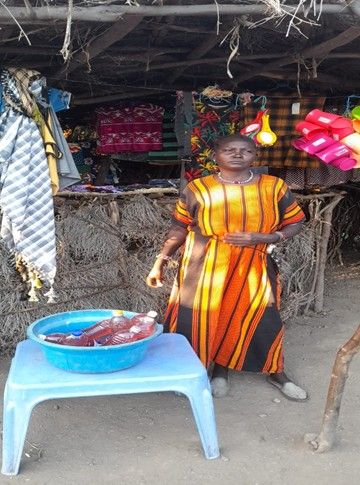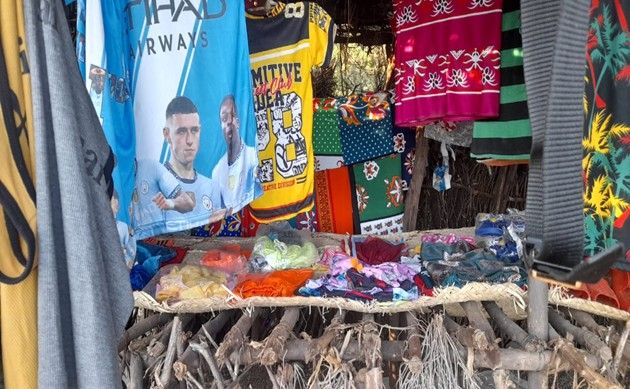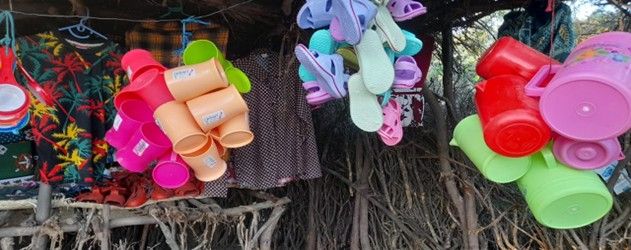In Kokuro village, Turkana North, the journey of Pauline Ewat Ngare, a 52-year-old widow and mother, reflects the transformative power of financial inclusion. Her story is one of resilience, hope, and the life-changing opportunities made possible through the Lowat Loruth Village Savings and Loan Association (VSLA), supported by DanChurchAid (DCA) under the SPREAD Project.
Life Before VSLA

For many years after losing her husband in 2011, Pauline lived in extreme hardship. With no reliable source of income, she struggled to provide food, education, and healthcare for her children.
- Food insecurity: Her family, including children under five, often spent the entire day without a meal, leading to malnutrition cases in her household.
- Education barriers: Her eldest son dropped out of secondary school because she could not afford the fees.
- Healthcare and basic needs: Medical expenses, clothing, and shelter were constant challenges.
- Unemployment and vulnerability: Limited access to financial services made it impossible to pursue economic opportunities.
“I used to survive with my children by fetching water and firewood for neighbors,” Pauline recalls. “Sometimes I would exchange a headload of firewood for just 500 grams of maize. My family often had only one meal a day. To survive, I washed clothes, cooked food, and fetched water for people so my children could eat in the evening.”
Intervention
Change began in August 2024 when Pauline’s VSLA group was formally onboarded by DCA through the SPREAD Project. She received training in:
- Financial literacy
- VSLA principles and modules
- Basic business skills
Her leadership potential was quickly recognized, and she was selected as one of three Trainers of Trainees (ToTs) from the Lowat Loruth VSLA. Pauline attended a five-day training in Lokitaung, Turkana North, where she deepened her knowledge on savings, loan management, and entrepreneurship. She then returned to Kokuro village to train fellow group members, empowering them with the same skills.
Achievements

With new financial discipline, Pauline began making consistent savings. Over time, she accumulated KES 7,000, which made her eligible for her first loan of KES 20,000. She invested in livestock trading, buying and selling animals for profit while steadily repaying her loan with the required 10% interest.
“After learning the importance of being an eligible entrepreneur, I saved KES 7,000. With my first loan of KES 20,000, I started a livestock business. The profits helped me repay my loan and build confidence as a businesswoman,” Pauline shares.
Encouraged by her success, Pauline diversified. She launched a boutique business at her home, selling clothes, beads, shoes, and petrol for motorbikes. Today, her businesses are thriving.
Her efforts have brought remarkable change:
- Improved income: Steady earnings from livestock trade and boutique sales.
- Family well-being: Better diet, medical care, and the ability to pay school fees.
- Leadership: Pauline has become a role model, inspiring women in her group to save, borrow responsibly, and invest in businesses.
Impact & Lessons
Pauline’s story demonstrates how financial inclusion goes beyond money—it restores dignity, builds confidence, and strengthens resilience. As a ToT and entrepreneur, she is now a beacon of hope in Kokuro village, showing other women that sustainable livelihoods are possible through savings, discipline, and entrepreneurship.
Conclusion & Recommendations
From surviving on menial jobs to becoming a successful businesswoman, Pauline’s journey proves that small interventions can lead to big transformations. Her story underlines the importance of continued financial literacy, VSLA expansion, and entrepreneurship support to uplift more women, youth, and vulnerable households.
As Pauline herself testifies, “Saving and responsible borrowing changed my life. Now, I encourage other women to do the same so that they too can transform their families

